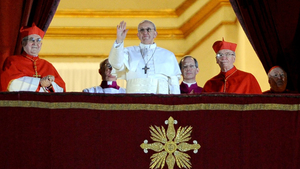The wind blows where it wills, and you hear the sound of it, but you do not know whence it comes from or where it goes; so it is with every person who is born of the Spirit. (John 3:8) A puff of white smoke! A new Pope! Cardinal Jorge Mario Bergoglio, now Pope Francis, becomes leader of the Roman Catholic Church. On the balcony overlooking Saint Peter’s Square he addresses the people of the world. His first words are memorable. In times of uncertainty, disruption, division, and alienation, he offers the image of a “camina,” a walk, pilgrims together, and then, spontaneously he includes all people of good will with the faithful.
The results of the election were a surprise; why he was elected is not a surprise. Leaders who know why, not only what and how, are the true leaders who inspire people into action. The why of the Gospel is the why of Pope Francis and it is the why of Christians and people of good will, it is to seek the needs of the poor, the disenfranchised, the marginalized, and to respond with a generous heart.
Jorge Mario Bergoglio is a Jesuit and Jesuits have given their lives for the education of the poor. Who will ever forget the slain bodies of six Jesuits, their housekeeper and her daughter, in El Salvador, lying on the lawn of their home! The Cardinal Archbishop of Buenos Aires, Argentina lived in humility rather than in triumph. At home he lived spartanly and frugally by giving up the Bishop’s palatial residence and taking up home in an apartment, cooking his own meals. He travelled by bicycle and by bus. He witnessed to the why of the Gospel not just the what and how, which he wants to share with others, and that means all humanity.

The Pope, when he was Cardinal Archbishop, preached about each person’s need of the spirit, without which they will not know the why of their faith. It is when Christians are seized by the why of their faith that they will not simply do what is commendable as good works, but they will be Gospel-inspired into action.
It can only be in the context of why, not what or how, that Pope Francis will address the doctrinal issues. Doctrine comes from the French word “docteur” which means that doctrines are to be healing doctrines. Healing doesn’t come from what or how, it comes from why and it is why that inspires people into action.
The sudden and unexpected resignation of Pope Benedict occurred after eight roiling years of damaging accusations brought against the Roman Catholic Church. The initial disclosure by the media of the priest pedophile sex scandal grew into a world-wide recognition of a flawed leadership that eventually rent the curtain on the hierarchy from the very top to the bottom. The church was not spared from a thrashing from all quarters from outside, and from inside the bastion of religious certainty. It could have been avoided only if it had been repeatedly and consistently self-critical. The lack of self-criticism resulted in endless cover-ups to serve as an armoured defense against any wrongdoing. The armour displayed dents but it was only when there was full disclosure that long-held apologias, based on long-standing assumptions, the very foundations of the church, were no longer defensible.
The election of Jorge Mario Bergoglio erupts from a past that already weighs heavily upon his shoulders. Pope Francis cannot and will not leave the history of the church behind him and begin a new chapter. Popes always follow the line of their predecessors of whom they are their successors and have an allegiance to what they have said and done. The striking reality is that Popes have brought about change when and where there is a need for reformulations of the doctrines of the church or there are blatant contradictions in the teachings of the church. The Second Vatican Council was called because Pope John XXIII realized that a reformation of the church was required because the church needed renewal of its old formulae and practice.
Pope Francis has been labeled as a pastoral man. He is everyman. He lives in an apartment, makes his own meals, travels by bike and bus, and frequently visits the poor in their environment. He returned to the hotel to pick up his luggage and pay his bill. A crying need for servants to be close to those they serve may have been re-awakened. There are hopeful indicators that Francis is pointing us towards an imminent God who is experienced in what we say and do with and for each other. Francis of Assisi tore off his robes of wealth and stood naked before he donned the garb of a poor man, Francis Xavier was a missionary whose exploits brought faith to a people in a distant land, and Francis de Sales became noted for his deep faith and his gentle approach to the religious divisions in his land resulting from the Protestant Reformation. Francis of Assisi, the founder of the Franciscans, may be the saint the Pope wishes to emulate, but as to the other two, Francis Xavier was a co—founder of the Jesuits and Francis de Sales was educated by the Jesuits must also be in the mind and heart of the Holy Father, a Jesuit. A three-fold ministry for Pope Francis, reaching out to the poor, building a missionary church rather than a maintenance church, and offering a gentle openness to ecumenical and interreligious dialogue. In the Gospel of Luke (12:48) we read: He who did not know, and did what deserved a beating, shall receive a light beating. Every one to whom much is given, of him will much be expected; and of him to whom men commit much they will demand the more.

























Commentaires
Veuillez vous connecter pour poster des commentaires.